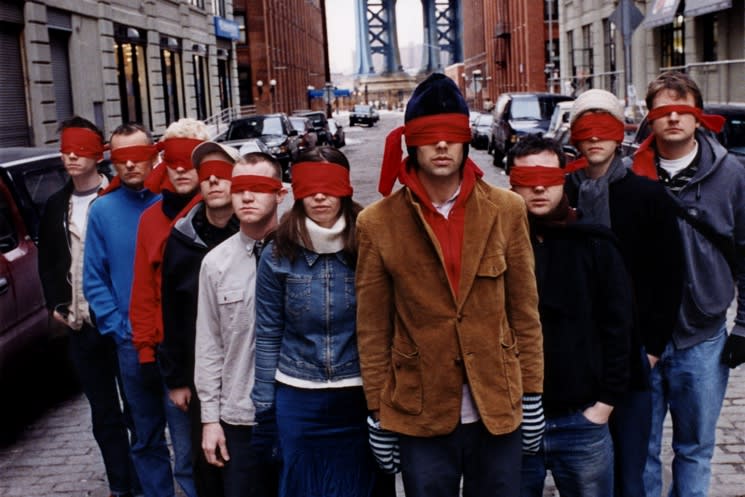"We didn't quite fit in the scene," Joel Gibb of the Hidden Cameras tells Exclaim!, reminiscing about the period when his Toronto-founded band recorded their 2003 album, The Smell of Our Own.
Or, to put it another way — the Hidden Cameras were their very own scene, an entire congregation of contributors, large enough to bring choral vocals and church-like grandeur to joyful indie pop songs.
The Smell of Our Own — often described as the band's official debut album, following's 2001 DIY effort Ecce Homo — came out on April 15, 2003, and is being reissued with bonus tracks in celebration of its 20th anniversary (and is available to pre-order here). Two decades later, the arrangements still sound towering and the melodies irresistible: "Ban Marriage" is a euphoric rush of wordless "whoa-oh" hooks that soar heavenward, while "Smells Like Happiness" begins as a simple singer-songwriter ditty that gradually adds layers until it's skipping along on a foundation of clap-along percussion.
What really makes The Smell of Our Own stand out is the way these sweet pop ditties are paired with strikingly plainspoken lyrics — from the pee euphemisms of gilded opener "Golden Streams" to strikingly visceral descriptions of sex, it remains unusual to hear pop songs quite this liberated.
As The Smell of Our Own turns 20, we caught up with frontman Gibb about the band's utopian ideals, holding an anarchist Catholic event the same time the Pope came to town, and how the smell of The Smell of Our Own is baking bread.
What do you remember about making The Smell of Our Own?
I will always associate London, ON, with the The Smell of Our Own, as it was recorded and mixed by Andy Magoffin at the House of Miracles. It was recorded near the bread factory; its smell I associate with the long sessions of recording and mixing with breaks to get Thai food next door. The pipe organ and choir overdubs were done in the Church of the Holy Trinity the same weekend that the Pope was visiting Toronto in 2002 for World Youth Day, the Catholic youth festival. We played a subsequent gig that same weekend in the church, an alternate unsanctioned anarchist Catholic event.
Listening back now to The Smell of Our Own, what stands out?
How bold and free the lyrics are. How joyous the music sounds. Its also clearly a bridge from my bedroom four-track recordings, Ecco Homo, to a full multi-track, symphonic sound.
What does this record mean for you as a band — both at the time it first came out, and now in hindsight?
There was an element of anticipation since we were doing many talked-about gigs in Toronto. It was a time when I was adding a band member with each gig we did until I amassed 12 members. I was young and naïve and that is always a great place to be when making a record.
Is there anything you wish you had done differently on The Smell of Our Own? Conversely, is there anything about it you wish you had carried forward to subsequent releases?
Andy Magoffin didn't have a computer at that time so we did live mixes to a CD from DA tapes, so perhaps it could have been mixed somewhere else. It was made at a time when computers were becoming the norm.
The early 2000s were a pivotal time for Toronto indie rock, with lots of notable bands getting their start. What do you remember of the local community at the time, and your place within it?
The band was half University of Toronto students and alumni, and half queer art and film community. It was a time when different communities overlapped, or at least in my head I thought they should. I wanted to create a band that had that utopic image, a band of disparate people, different ages and genders and musical abilities. I think we were existing in a bubble; we didn't quite fit in the scene, as it were.
The reissue of The Smell of Our Own includes some demos and B-sides. How do these extras shine a different light on the album and your work at the time?
There are a few four-track demos on the bonus disc, and they show the process of songwriting, since they were recorded before the album had started. The B-sides reinforce the character of the record; "Fear of 'Zine Failure," in particular, is a standout track that finally gets its right place on the reissue. The CBC sessions reflect the live band vibe circa 2002 and also have a lot of charm.
There hasn't been a Hidden Cameras album since 2016, but you've released a couple new singles in the last couple years. What's next for the project?
I have been recording electronic music in Munich for a few years and hope to share that with the public in the future. I also wonder about possibly making another album in the original Cameras style: acoustic guitar strums, pipe organ drones, tambourine and xylophones.
'The Smell of Our Own' Turns 20: The Hidden Cameras Reflect on Their "Unsanctioned Anarchist Catholic" Utopia
"I wanted to create a band that had that utopic image, a band of disparate people, different ages and genders and musical abilities"

BY Alex HudsonPublished Apr 13, 2023



